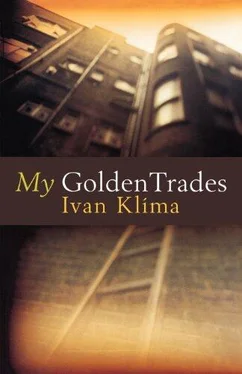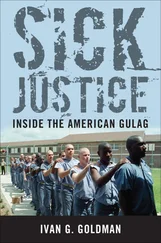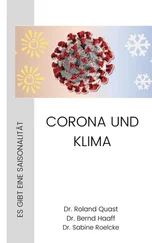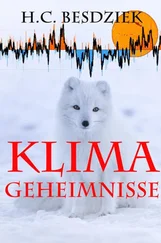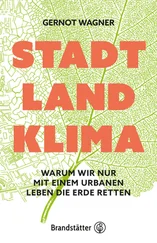Ivan Klima - My Golden Trades
Здесь есть возможность читать онлайн «Ivan Klima - My Golden Trades» весь текст электронной книги совершенно бесплатно (целиком полную версию без сокращений). В некоторых случаях можно слушать аудио, скачать через торрент в формате fb2 и присутствует краткое содержание. Год выпуска: 1998, Издательство: Granta UK, Жанр: Современная проза, на английском языке. Описание произведения, (предисловие) а так же отзывы посетителей доступны на портале библиотеки ЛибКат.
- Название:My Golden Trades
- Автор:
- Издательство:Granta UK
- Жанр:
- Год:1998
- ISBN:нет данных
- Рейтинг книги:4 / 5. Голосов: 1
-
Избранное:Добавить в избранное
- Отзывы:
-
Ваша оценка:
- 80
- 1
- 2
- 3
- 4
- 5
My Golden Trades: краткое содержание, описание и аннотация
Предлагаем к чтению аннотацию, описание, краткое содержание или предисловие (зависит от того, что написал сам автор книги «My Golden Trades»). Если вы не нашли необходимую информацию о книге — напишите в комментариях, мы постараемся отыскать её.
My Golden Trades — читать онлайн бесплатно полную книгу (весь текст) целиком
Ниже представлен текст книги, разбитый по страницам. Система сохранения места последней прочитанной страницы, позволяет с удобством читать онлайн бесплатно книгу «My Golden Trades», без необходимости каждый раз заново искать на чём Вы остановились. Поставьте закладку, и сможете в любой момент перейти на страницу, на которой закончили чтение.
Интервал:
Закладка:
When I was still young, I understood that, despite what I was taught in school, the age I lived in was probably called the age of engineering.
I disconnected my lamp and put my immersion heater in a cup of water. While I was waiting for it to boil, I spread a serviette over the chair that had no back, and unwrapped a piece of cake my wife had baked; then, so I wouldn't entirely lose touch with the world, I turned on one of the portable products of the technological age and, from the airwaves, tried to collect news from different corners of the planet.
The night air flowed through the open window, cool and pleasant. Carefully, so as not to get dirty, I approached the window ledge and looked down the square. It was empty. Prime time was just beginning on another revolutionary achievement of our civilization. Two drunks staggered about in front of the pub across from the church. Occasionally a car roared past. There was not a single woman in sight. Before me stretched an evening promising neither joy nor guilt: I didn't have to write or study. I could enjoy my freedom the way a worker does, freshly showered and freshly dressed after work; and moreover, hidden away in a town where no one knows him, expects him, or limits his movements.
I drank my tea and its aroma helped to cover the stench that still lingered in the room. I ate the cake, switched off the radio and walked out of my inhospitable bedroom.
There was light in the hallway of my building and, sitting on a kitchen chair, a rather plump woman of around sixty. She was stretching her short, fat legs in front of her; her hair, crudely bleached, was fluffed up in a messy bouffant. She had been reading an illustrated weekly for young
people. Beside her on a small pile of bricks sat a birdcage with a canary inside.
I greeted her and was about to go on when she called to me, 'Are you the new surveyor?'
I admitted that I was.
She stood up and offered me a chubby hand. 'Welcome to my house. I used to have five tenants,' she said. 'There was Mr Wolf, an army captain, and Dr Tereba — do you know him? He was a great prophet. He knew the stars and could cast people's horoscopes and tell their fortunes, but he'd only give them the rough outlines and keep the bad stuff, and the worse stuff, to himself. Now there's only Julka and me,' she nodded towards the cage. 'I hear they're going to build a railway station on this spot.'
'That can't be true,' I said. 'The line doesn't run anywhere near here.'
'That kind of detail never bothers them.'
Her objection had a logic of its own, and so I merely shrugged my shoulders, meaning that I knew nothing about a new station.
'My great-grandfather built this house, sir. And it was declared an historical building. They used to print diaries, almanacs and poetry here.'
'Was he a printer — your great-grandfather?'
'He was the district and episcopalian printer. He was born in eighteen hundred odd, but this is where he got his start, and when he died he left the building to my grandfather. And you know how long he lived? An even one hundred years. Back then, in Chrudim, there was a woman called Kroupová—she was Turkish. A soldier brought her back from Belgrade when she was just a little girl. He had her christened and he brought her up himself.
Then she lived in the same street as my great-grandfather, and she lived till she was a hundred and six — such are the ways of the Lord. At her funeral, my great-grandfather promised that if the Lord was willing, he'd live to be a hundred as well and enter the new century. If he'd had any idea what this one'd be like, he'd have thought twice about it. Grandfather lived to be ninety-six, but my father was killed in a concentration camp before he'd even turned forty. It was the Lord's will. At least he didn't have to look at this destruction,' and she waved her hands at the wall behind her, where bare brick and the broken windows of empty flats stared back at us. 'He should have had a memorial plaque here but they wouldn't allow it because he was a private businessman and a member of Sokol.'
'Was he a printer too?'
'No, he sold books — and mainly stationery. You should have seen our sign. "Antonín Pokorný," it said, and underneath that, in gold lettering: "Purveyor of Books, Lithographs and Stationery Supplies." Everyone knew my father, and he knew all his customers by name; he'd always give the children a free picture or a decal. You could buy whatever you wanted — even if it was paper with a special snake-grain finish. And if, by some miracle, it wasn't in stock, Dad would try to get it for you, would go all the way to Prague for it if he had to. Today? Just try going into the store now and asking for ordinary writing-paper. The girl will laugh in your face. Have you seen her?' she lowered her voice. 'The little tramp they've got looking after the stationery goods? Just try going in there to buy something and what do you see on the door? She's got a sign up saying: "Deliveries." "Gone to the post office." "Inventory Day." "I'm at the doctor's." And you know where she is all
the time? Back here in the stock-room,' she jerked a fat thumb behind her, where I could see only a barred window with opaque glass in it. 'She brings in soldiers and boys from the cement plant. She makes more on her back than she does standing behind the counter. So you haven't heard about the station?' she said, returning to her main preoccupation. 'Maybe they meant a bus station. The chaplain's been complaining that he can't say mass with the buses making all that noise just outside his door.'
To them, that would have been a reason for leaving the bus station where it was, but I didn't argue with her and, taking advantage of the pause in the flow of talk, I left the courtyard.
Even though he never said as much, I know my father was disappointed that I hadn't become an engineer. I had never known his father — he had died twelve years before I was born — but not long ago, I came across an article he had written. He'd learned that an American colleague of his had discovered a cheap way to produce acetylene. 'The ancient dreams of chemists of creating organic compounds from mineral substances have been resurrected. To get not only kerosene or alcohol, but to create, on the way, purely chemical substances necessary for the nourishment of man. Thus far, such dreams have been vain indeed, but recalling the enormous achievements of chemistry in our time, there is no reason to doubt that they might one day become true.' His article ended with a vision that seemed to him joyous and full of hope.
A few fluorescent lights flickered on the square, and a small group of people had gathered to wait for a late bus in front of the church. The shops were shuttered and dark, and the only light came from a pub called The Blackbird. The
din of many voices floated out through the open window.
I walked as far as the château. The gate was now shut and only a single window in a whole row was lit. An ambulance was parked in front of the gate.
Kafka had lived at the end of an era when a castle was still a good symbol of mystery and inaccessibility. People associated castles with nobility and sophistication. Today, our castle gates are open wide. Some have been turned into tourist attractions, but most have become warehouses for things or people. The fine furniture and valuable porcelain has been stolen or destroyed, rare books have been taken to waste-paper depots, and the princesses who didn't manage to make their escape were asked to work behind counters, on assembly lines or in offices. In our era, party secretariats have replaced the castles. They are the new symbols of inaccessibility, but they don't evoke notions of nobility; no one would associate them with ideas of gentle birth, bravery, wisdom or chivalry.
A hero who tries to pry open the gate of a secretariat will scarcely gain anyone's approval.
Читать дальшеИнтервал:
Закладка:
Похожие книги на «My Golden Trades»
Представляем Вашему вниманию похожие книги на «My Golden Trades» списком для выбора. Мы отобрали схожую по названию и смыслу литературу в надежде предоставить читателям больше вариантов отыскать новые, интересные, ещё непрочитанные произведения.
Обсуждение, отзывы о книге «My Golden Trades» и просто собственные мнения читателей. Оставьте ваши комментарии, напишите, что Вы думаете о произведении, его смысле или главных героях. Укажите что конкретно понравилось, а что нет, и почему Вы так считаете.
